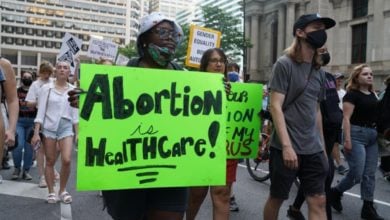In the first Christmas Eve session since 1895, the U.S. Senate passed a much anticipated and debated healthcare reform bill.
 |
The outcome of the second-longest legislative debate in the Senate history is a health care bill that does little more than provide a big gift to the health insurance industry. The House version is scarcely better.
The Senate and House versions of the health care reform bill need to be consolidated. The outcome of these negotiations, however, will not affect the basic character of the bill.
The most important question for millions of people in the United States is will the reform bill really provide affordable health care coverage that doesn’t leave people deciding between medical bills and rent, food, and other necessities.
The short answer is no. The congressional representatives of the capitalist ruling class—both Democrat and Republican—have passed a reform measure that does little for the masses of people while including mandates and taxes that will actually profit the insurance and pharmaceutical industry.
The bill mandates everyone have insurance or face a penalty—minimally $750 or 2 percent of income, whichever is highest. At the same time, there is no provision for affordable coverage. Essentially, the U.S. government is “fixing” the health care crisis by demanding that everyone have health care without implementing a system to provide health care.
The real solution is universal, comprehensive health care for all. The capitalist government is not interested in providing this type of care.
It is interested in something quite different—managing the interests of the ruling class. And the small class of bankers and corporate owners is driven by a constant and forceful need for greater and greater profits. This driving force is the reason behind the recent failure of the U.S. Congress to enact meaningful reform.
The crisis of health care in the United States is well-known. Forty-seven million people suffer without health care and millions more suffer because of inadequate health care coverage. The rampant exploitation and profit seeking of the major health care corporations—primarily those of the insurance and pharmaceutical industries—is the cause.
There are more than 1,300 private insurers in this country. They set premiums, co-pays and out-of-pocket expenses high, routinely deny necessary treatment and deny coverage to applicants for a host of minor reasons. Until now, these insurers have been completely unregulated. The dominating insurance companies make huge profits every year.
In 2008, 59.5 percent of people had coverage through their employer. That number has decreased significantly in 2009, as a result of the health care crisis. Employers—facing skyrocketing costs in health care—have pushed those costs on to the employees. Many people are now forced to pay significant amounts from their paycheck and are subjected to barebones coverage selected by their employers.
In concrete terms, the cost of healthcare is consuming more and more of society’s resources. In 2007, over $2 trillion was spent on healthcare in the form of insurance, care, pharmaceuticals and medical equipment according to a study by the Economic Policy Institute. According to the Presidents’ Council on Economic Advisors, from 1996 to 2006 the average health insurance premium for a family rose 85 percent from $6,462 to $11,941. National expenditures on healthcare as a share of the Gross Domestic Product, that is the value of all goods and services produced annually in this country, has nearly doubled from less than 10 percent in 1980 to 18 percent this year.
And yet, the right to healthcare is more and more out of reach for millions.
For the working class, the crisis is deeply felt. It is a crisis that leaves working people without the most basic health care provisions. In the case of an emergency, workers are left to choose between rent, food, education and exponentially rising medicals bills. A study by the Urban Institute estimated that 137,000 people in the United States died between 2000 and 2006 due to a lack of health insurance.
The crisis has also had its effects on the ruling class—and this is at the heart of the health care reform. The spiraling cost of healthcare has become an obstacle to the sole purpose in life of the capitalist ruling class, the making of profits as a result of exploiting human labor.
From the very beginning of the Obama administration’s push for health care reform, the most effective and efficient response to the health care crisis, single payer health care, was purposefully left out of the discussion.
Single-payer health care is a system where the government acts as a single payer—representing millions of people. Doctors and hospitals bill directly to a government entity, removing the need for private insurance corporations.
While admitting that single-payer health care would make health care more accessible, neither Republicans nor Democrats ever considered single-payer health care an option. Why? The profits of the health care industry were the starting point for health care reform.
After a meeting with the president, Rep. Lynn Woolsley quoted him, “He said if he were starting from scratch, he would have a single-payer system. But he thought it wasn’t possible, because it would disrupt the health care industry.” Every major Democrat and even the Progressive Caucus joined the President in refusing to support single-payer health care. They actively denied those who support single payer a seat at the table for the debate—much less did they consider it for legislation.
The public option—where individuals buy insurance from the government in regulated markets called exchanges—would decrease health care costs in two ways. One, the government is able to obtain health care at reduced prices. Two, the competition by the public option forces insurance companies to lower costs for the majority of consumers as well.
The public option, too, was gutted in the House version of the bill and does not exist in the Senate version. The House version requires the government to negotiate rates with individual providers—stripping the public option of its ability to lower costs.
So, how will health care be provided?
Employers are required to provide insurance or face penalties but there is no stipulation on the level of coverage or quality of care they have to provide. However, employers with an annual payroll under $500,0000—87 percent of businesses—are exempt from this requirement.
Legislators also agreed on creating federal exchanges, or markets, that will supposedly offer small businesses and individuals a way to pool their resources and access cheaper coverage. Federal subsidies will be provided to those who are eligible and Medicare is being expanded.
None of these options will guarantee affordable quality care for the millions that will now be required to purchase insurance or those who already have inadequate coverage.
Also, coverage does not extend to millions of undocumented workers—effectively denying more than 12 million workers access to health care. The bill not only denies coverage but makes it harder for undocumented immigrants to access health care.
Federal money, in subsidies and federally funded plans, will not be used to cover abortions—severely limiting a woman’s right to choose.
The bill also includes a 40 percent excise tax on plans of $23,000 for groups and $8,500 for individuals—on plans that have been mislabeled “Cadillac Plans.” Within three years of implementation, the tax will affect 3 million people. Within six years, 20 percent of all households earning between $50,000 and $75,000 annually will be eligible for the tax. The expected outcome is that employers and individuals will choose less costly plans—losing dental, vision and other benefits.
Health care has been a major factor in every contract struggle as bosses try to push costs onto workers. The health benefits tax will particularly target the hard won gains of unions that have defended their workers against this onslaught. It will, no doubt, negatively impact future contract struggles.
The health benefits tax penalizes those who have health coverage in order to raise money to pay for others health care. Legislators don’t expect the tax to raise money directly. Rather they have assumed, ridiculously, that employers will use the money saved by choosing cheaper plans to increase their workers’ wages. Then, higher wages will increase income tax revenues.
In response to this ludicrous proposition, Larry Cohen, president of the Communication Workers of America said, “In the real world, companies cut costs and they pocket the money. Executives tell the shareholders: ‘Hey, higher profits without any revenue growth. Great!’”
Insurance and pharmaceutical companies are the big winners here.
Ultimately, insurance companies are gaining millions of customers and facing regulations that only minimally limit their ability to exploit health care needs to make profits. Pharmaceutical companies will continue to make huge profits off the production of costly prescription drugs.
The majority of people in the United States are the losers. Working people will be forced to buy health care or face penalties. Their employers will be motivated to buy cheaper health plans with worse benefits. If workers can afford to buy good health care on their own, they will also face penalties.
All people should have a right to full, comprehensive health care. Genuine reform is impossible if the right to profit is protected while health care is treated like a commodity.






